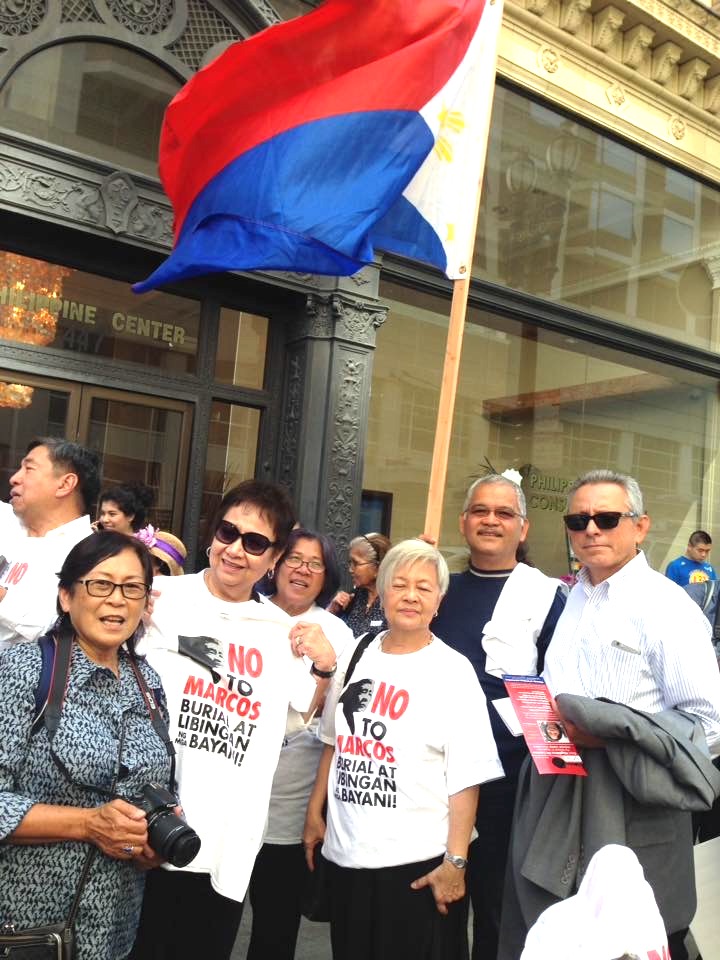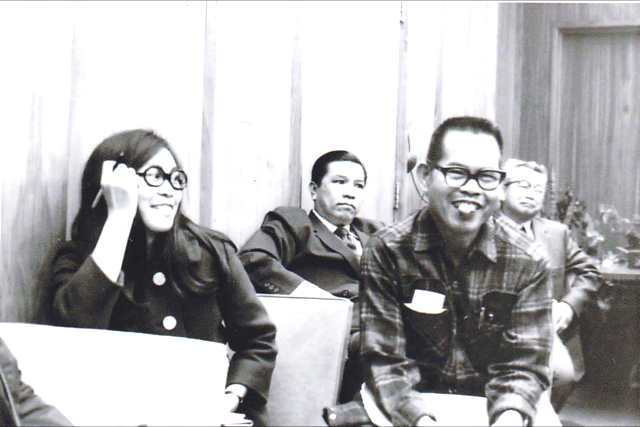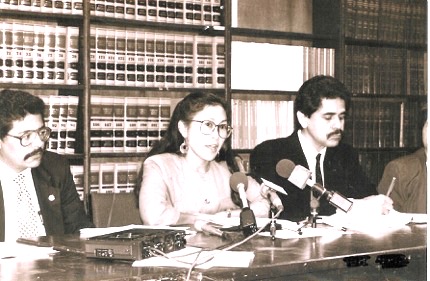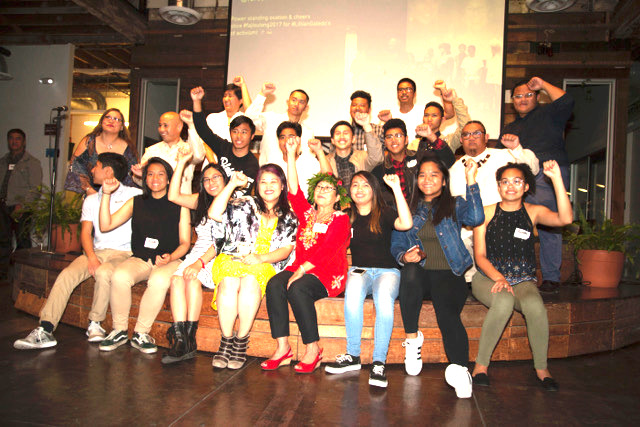Lillian Galedo, top community organizer-leader, retires after decades of service
Lillian Galedo joined other immigrant rights leaders in denouncing the discriminatory Simpson-Mazzoli immigration bill at a press conference in the early 1980s. CONTRIBUTED
In her speech at the gala event that the Filipino Advocates for Justice (FAJ) held in her honor on April 27, 2017, outgoing Executive Director Lillian Galedo stated, “In 1984, we carried a huge banner that I had painted myself to a rally at the U.S./Mexico border, saying, ‘Stop the Deportations of Immigrants and Refugees’.”
Ironically, decades later, the message on that banner is still a rallying cry against the Trump administration’s anti-immigrant agenda and controversial Muslim ban. Galedo was relieved to hear, however, that on the morning after the November presidential election, the California State Legislature issued a statement to the new administration that it would not be on board with its agenda of hate, division and corporate power. “It is our duty to resist and resist we would,” she pledged to about 400 people in the audience.
Resistance was something that never crossed Galedo’s mind while growing up in the 1950s and 1960s in south Stockton, California, then unincorporated. She lived on a street, populated by many Filipinos, without streetlights or sewer system. She recalls how her farm worker father would come home so exhausted that all he could do was have dinner, watch a little TV and ask one of his kids to walk on his back to ease the pain of toiling long hours in the fields near their home.
Although her parents tried to insulate their children from farm work, Galedo’s father had no choice but to ask his family to occasionally help out in order to boost his output. She never heard her parents talk about discrimination but the stark class divisions were all around her. Main Street served as a dividing line between the haves and have-nots, with poor whites and minorities on the south and east side of town and the middle and upper classes north of Main.

The FAJ contingent getting ready to join the May Day march this year. Galedo, holding the banner, is second from the right. CONTRIBUTED
The second daughter of immigrants Inocencio Galedo and Sotera Ladaga, who both hailed from Garcia-Hernandez, Bohol, Galedo had mapped out a future somewhat based on her older sister Herminia’s career trajectory. After high school graduation, she would go to a community college, proceed to San Jose State University for an education degree, and become a teacher for the next 30 years. In grammar school, while taking catechism, she even thought, albeit briefly, of becoming a nun, believing that religious service would earn her many points in heaven.
Galedo’s aspirations at the time did not go beyond what was familiar or what her family expected, until an affirmative action program intervened and changed the direction of her life.
In 1968, the University of California, Davis, through the Educational Opportunity Program (EOP), did a massive recruitment of about 100 youth from underrepresented minorities from the Central Valley and inner city to receive full financial aid and generous support services to help them finish college. Galedo, who had already gone to a community college for two years, became one of the lucky recipients and spent the last two years of her college education, majoring in child development, at UC Davis, then a nearly all-white campus. But the school not only provided her with a higher education but it also exposed her to the activist ferment sweeping universities nationwide.
It was 1968, and campuses were a hotbed of dissent and burgeoning student activism. The anti-Vietnam war movement, support for the struggles of the United Farm Workers, and Third World Liberation movements aimed at correcting the lack of diversity on campuses provided an instant political education for the conservative Stockton native, who had supported the war out of a sense of patriotism. Meeting an Asian American professor further fueled her interest in her own identity as a Filipino and as an Asian American.
Through a work-study program at UC Davis, Professor Isao Fujimoto became Galedo’s mentor. Her main task was to clip articles from the New York Times. In doing so, Galedo’s mind widened as she imbibed the news about activism on other campuses and what was happening in the rest of the U.S. and the world.
She explained, “My two years in Davis allowed me to be open to other things outside the traditional role that most Filipinos were taking. Professor Fujimoto, who inspired me and other Asians to start Asian American Studies at UC Davis, still checks on me nearly 50 years later. He wrote me a note and donated to FAJ upon hearing of my retirement.”

Galedo (far left) joined other former KDP activists in San Francisco last year to protest the burial of Philippine dictator Marcos at the Heroes Cemetery. CONTRIBUTED
After graduation, Galedo began a series of jobs at government agencies, universities and non-profit organizations in different cities, including a one-year stint in San Francisco, where she went to support Fil-Am activists involved in a bitter struggle to prevent the evictions and demolition of the International Hotel. Many poor elderly Filipinos and other low-income people lived in the Chinatown building and were facing eviction. She worked during the day and volunteered her evenings and weekends supporting the residents of the I-Hotel, the first citywide struggle she took on involving a number of Fil-Ams.
Through this involvement, Galedo met members of the Kalayaan collective, who would soon found the Union of Democratic Filipinos (KDP). The collective exposed her to a more revolutionary perspective on the deteriorating socio-economic conditions in the Philippines under President Ferdinand Marcos, as well as the discrimination faced by Filipinos in the U.S. But before Galedo could get a deeper understanding of this progressive analysis, she went back to UC Davis to finish a study about Filipinos in Stockton, funded by the Ford Foundation.
Upon completion of that report, she got a job as an eligibility worker at the Welfare Department in her hometown and got assigned to East Stockton, allowing her to get to know more about her own community. She later took a position with a Chicano research group, interviewing farm workers and former farm workers in the greater San Joaquin County. Through her years of experience working with diverse campus groups and communities, she began to envision a future for herself. “By the time I finished the project, I believed that working in my community was my purpose in life.”
This mission guided Galedo’s further career and volunteer choices. She continued to focus on community advocacy during the ensuing years, from setting up student support services at UC Santa Barbara to help students of color to stay in school, to being part of the Filipino Education Task Force, which lobbied to improve how Filipinos were treated in textbooks, to getting involved in defending the Asian American Studies program at U.C. Berkeley. As the 1970s marched on, two major junctures occurred in the Filipino community that became impetus for Galedo’s new activism.
In 1972, President Marcos declared martial law in the Philippines and six years later, after she came back to the Bay Area, Galedo joined the KDP, the national activist organization that fought against the dictatorship and for the rights of Filipinos in the U.S. The deaths of her KDP comrades, Silme Domingo and Gene Viernes, who were killed by Marcos assassins in 1981 in Seattle, further consolidated her commitment to the fight for equality and social justice.
The KDP national leadership posed to her a challenging task: Would she leave her job for two months to help the Seattle chapter in organizing the Far West Convention, dedicated that year to the memory of the two martyrs? At first she hesitated, doubting her leadership capability and whether she could leave her job on the spot. After mulling over the request and getting inspiration from the strong women in the KDP, she responded, “O.K., I could be ready to leave in two weeks.” [Note: Galedo’s account is included in the upcoming KDP book A Time to Rise: Collective Memoirs of the Union of Democratic Filipinos.]
In the 1970s, the Filipino population in the U.S. was beginning to grow considerably as a result of the passage of the Immigration and Naturalization Act of 1965, which increased the immigration quota for all countries. The shift in demographics presented an urgent need to address the demands of new immigrants for equal access to education, workplaces, and housing. Thus, Galedo’s thirty-seven years in non-profit management began.

College senior Galedo enjoying a light moment at a Filipino conference in Sacramento in the early 1970s with Larry Itliong, a Fil-Am labor leader and one of the heroes of the West Coast farm labor movement. CONTRIBUTED
Galedo, who had started as an outreach worker at Filipinos for Affirmative Action (FAA) in 1980, was named the executive director in 1983. Thirty years later, the organization was renamed Filipino Advocates for Justice, in recognition of its expanding advocacy mission, which now included fighting anti-immigrant policies, expanding the rights of immigrants and low wage workers, helping pass the California Domestic Worker Bill of Rights, local violence prevention measures, and tenant protections, and getting out the growing Filipino vote.
Bill Tamayo, a civil rights attorney who was FAA board president from 1980 to 1987, called Galedo the “consummate advocate for immigrant workers.” Tamayo recalled, “I worked with her on the National Filipino Immigrant Rights Organization, the Bay Area Committee Against Simpson Mazzoli and the Committee to Defend Immigrant and Refugee Rights. We wanted to stop the discriminatory employer sanctions proposals and ensure that the amnesty program was fair. This was a period of immigration raids launched by the INS to get support for more interior enforcement and strike fear in immigrant communities. Lillian was part of the effort to stop the raids. The federal court later issued an injunction stopping the raids.”
Ernie Llorente, who served as Deputy City Attorney for the City & County of San Francisco until his retirement, had worked with Galedo on several Fil-Am community concerns. He praised Galedo’s inspiring leadership, stating, “During our many meetings and public forums, Lillian displayed her innate intelligence, her command of the issues based on research and critical thinking, and her strength and confidence that made her a natural and caring leader and true team player.”
Asked how she developed as a trailblazer that spearheaded grassroots efforts to advance immigrant rights and other key struggles affecting the Filipino community, she credited KDP as one of her major influences.
“The model of organizing in my head comes from the rigorous training in the KDP. Further, accepting a life of service and political engagement over a more materialistic career also comes from my exposure to the organization. Of course, it means that I’m now facing retirement without a pension but that comes with the territory.”
Galedo also acknowledged the Equal Opportunity Program at UC Davis, Professor Fujimoto, FAJ staff and board and everyone who had helped the organization over the years, and her husband, veteran activist David Bacon, for helping her build her own legacy at the FAJ and lead one of only a few progressive Fil-Am social service and civil rights organizations in the country.
Executive Director Lillian Galedo with the staff and volunteers of the Filipino Advocates for Justice (FAJ) at the April 27, 2017 gala event held in her honor. CONTRIBUTED
Asked what she would do in retirement, Galedo said, with a laugh, “I will clean out my garage and storage unit.” In a more serious tone, she emphasized that she was retiring from her job at FAJ but not from community service, to which she had committed her life four decades earlier. Barely two months after her farewell FAJ gala, the indefatigable activist, who is a cancer survivor, was already talking about the tasks ahead.
“We still have so much work to do — protect the environment for generations to come, win labor protections and living wage for all, end huge income disparities, and achieve affordable housing and health care for everyone – made more difficult by a new administration bent on rolling back any gains we’ve achieved in advocating for these issues. There is also the extrajudicial killings happening in the Philippines that we need to oppose.”
Galedo is confident that FAJ will continue to advance social and economic justice under the helm of her successor, Geraldine Alcid. Alcid has a long history with the organization, working on voter education, fund development, language access, and community outreach for the 2010 census.
Alcid’s words about her predecessor spoke volumes of Galedo’s lasting contributions to bringing the Filipino community’s voice into the larger progressive movement for social justice. She stated, “Lillian has stood up for the most vulnerable in our community — young people who were unfairly profiled, exploited workers, and the newly-arrived immigrants, including the undocumented. She emerged as a mighty change agent that brought people together, empowered them, and nurtured their leadership.”
Alcid, who has known Galedo for more than ten years, said she has always taught FAJ activists to “Never give up!” She noted, “I believe that her legacy to the Filipino community will be felt for many years to come through the people she has activated and those who have grown to emulate her commitment to justice and equity.”
Alcid added, “She may be retiring, but her activism lives on and serves as an inspiration to us all.”



